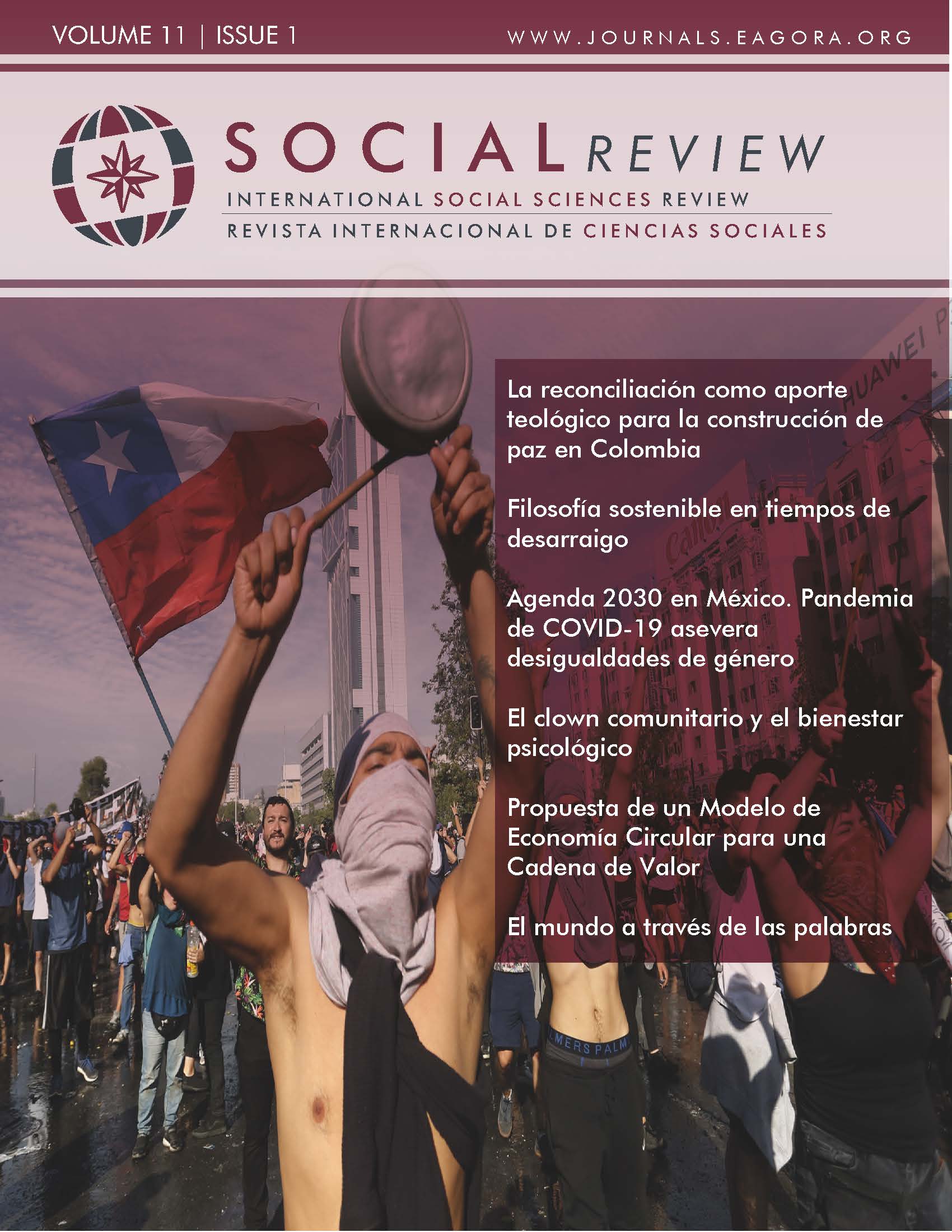Community Clown and Psychological Well-being
DOI:
https://doi.org/10.37467/gkarevsocial.v11.2445Keywords:
Clown, Community, Psychological well-being, Psychosocial processesAbstract
This publication intertwines community psychology and clown art to problematize psychological well-being; It arose from giving workshops with participants from cities in the Mexican Republic. The methodology used was the research called: "Participatory Action", to analyze the experiences of 10 years of work in 8 cities of Mexico. As a result, we found that well-being according to Prilleltensky, and cited in Montero (2004): In the sphere of individual needs, there was personal growth; in the relational sphere, the participants showed a commitment to the community, in the collective needs, by de-dramatizing the communities’ environments, they created a strengthening process.
Downloads
Global Statistics ℹ️
|
1069
Views
|
520
Downloads
|
|
1589
Total
|
|
References
Arés Muzio, P. (2018). Individuo Familia Sociedad, El desafío de ser feliz. Editorial Caminos.
Baumnan, Z. (2002). Modernidad Líquida. Fondo de cultura económica.
Botella, L. y Figueras, S. (2014) Introducción: Psicología y Pensamiento Posmoderno. ResearchGate. https://bit.ly/3ngPzt4
Chambers, R. (2006). Vulnerability, coping and policy. IDS Bulletin, 37(4), Institute of Development Studies, University of Sussex. DOI: https://doi.org/10.1111/j.1759-5436.2006.tb00284.x
CONEVAL (2018) https://www.coneval.org.mx/Medicion/Paginas/PobrezaInicio.aspx
Davis, K., & Montag, C. (2019). Selected principles of Pankseppian Affective Neuroscience. Frontiers in Neuroscience, 12(1025), 1-11. DOI: https://doi.org/10.3389/fnins.2018.01025
Diz Reboredo, C. (2011). Los caminos del clown: resistencia en movimiento. Juego, carnaval y frontera. Universidad de A Coruña. https://atheneadigital.net/article/view/v11-n2-diz/675-pdf-es
Eisenberger, N.I. (2019). Social ties and health: A social neuroscience perspective. Current Opinion in Neurobiology, 23, 407-413. DOI: https://doi.org/10.1016/j.conb.2013.01.006
Real Academia Española (2001). Diccionario de la Lengua Española (DRAE), en su vigésima segunda edición. RAE/Espasa calpe. https://www.rae.es/drae2001/rid%C3%ADculo
Ros Clemente, F. (2015). Cómo reivindicar derechos humanos a través del aerte del clown: la función social en el payaso. RES, Revista de Educación Social, 20. https://bit.ly/3vStqG1
Fernández, A. M. (2012). Jóvenes de vidas grises, psicoanálisis y biopolítica. Nueva Visión.
INEGI. (2022) Instituto Nacional de Geografía y Estadística. https://bit.ly/3P8ZL2b
Jara Fernández, J. (2000). El navegante de las emociones. En A. Mantovani (Coord.) SE RIE Educación: Pedagogía de lenguajes artísticos. Ediciones Novedades Educativas.
Kaminsky, G. y Varela, C. (2001). Grupo objeto y grupo sujeto. Mimeo.
Lecoq, J. (2004). El cuerpo poético. Una pedagogía de la creación teatral. (J. Hinojosa y M. M. Navarro, Trads.). Colección: Artes Escénicas. Alba editorial.
Maffi, I. (2010). El Clown como herramienta terapéutica. Una mirada transpersonal. https://bit.ly/3QNRhQb
Moscovici. (1999): Social Representations. Londres: Cambridge University Press.Sirvent María Teresa. Cultura Popular y Participación. Miño y Dávila Editores. Buenos Aires.
Montero, M. (2004). Introducción a la psicología comunitaria. Desarrollo, conceptos y procesos. Paidós.
Pereda, C. y de Prada, M. A. (2015). Investigación-acción participativa y perspectiva dialéctica. Arxius, 31, 57-68. https://drive.google.com/drive/folders/1ZTN6AiisNYHcuFFH3fUANwp_XyYgMVqE
Real Academia Española. (s.f). Cuidado. En Diccionario de la lengua española. Recuperado de https://dle.rae.es/cuidado?m=form
Sánchez, G. D. y E. J. C. (2011) Enfoque de vulnerabilidad social para investigar las desventajas socioambientales. Su aplicación en el estudio de los adultos mayores. Universidad Autónoma de Nuevo León y Universidad de Granada. https://bit.ly/3ynjrKt
Tellez Vargas, J. (2000). La noradrenalina, su rol en la depresión. Revista colombiana de Psiquiatría, XXIX(1), 59-73. https://www.redalyc.org/pdf/806/80629104.pdf
Zubillaga, P. (2018). Capitalismo y producción de subjetividad. Reseña de Alemán, Jorge. Horizontes neoliberales en la subjetividad, Grama ediciones, Buenos Aires. 2016. 192 p. Sociohistórica, 41, p. e055. https://www.memoria.fahce.unlp.edu.ar/art_revistas/pr.8556/pr.8556.pdf DOI: https://doi.org/10.24215/18521606e055
Downloads
Published
How to Cite
Issue
Section
License
Those authors who publish in this journal accept the following terms:
-
Authors retain copyright.
-
Authors transfer to the journal the right of first publication. The journal also owns the publishing rights.
-
All published contents are governed by an Attribution-NoDerivatives 4.0 International License.
Access the informative version and legal text of the license. By virtue of this, third parties are allowed to use what is published as long as they mention the authorship of the work and the first publication in this journal. If you transform the material, you may not distribute the modified work. -
Authors may make other independent and additional contractual arrangements for non-exclusive distribution of the version of the article published in this journal (e.g., inclusion in an institutional repository or publication in a book) as long as they clearly indicate that the work was first published in this journal.
- Authors are allowed and recommended to publish their work on the Internet (for example on institutional and personal websites), following the publication of, and referencing the journal, as this could lead to constructive exchanges and a more extensive and quick circulation of published works (see The Effect of Open Access).













